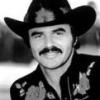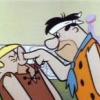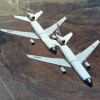You're missing the point. # of bombs dropped, pounds of gas given, pallets of rubber dog shit delivered is great stuff....but it isn't generally unique in this day and age. It tells me more about what you did than it does about how well you did it. It is also all stuff that can and is done primarily by captains.
So what is it about people that shows how well they can do as a major or lt col? Those ranks should be increasingly about being in charge of teams, projects, issues, etc. not just as recognition that you were assigned and completed tactical missions as a captain. Plenty of clowns have the same statistics.
I don't know where all this party planning crap comes from with you guys, as I've never seen that shit on an OPR (except maybe a lieutenant) and never put it on a PRF. But success leading teams and projects is relevant to the question at hand--is this guy capable of leading at the next rank. If a guy has never done any of that, then how would we know? I think we've all seen dudes who were awesome pilots and bros grow up to be shitty bosses. Showing experience and success with smaller scale leadership tasks at least indicates something about potential for success with medium to larger scale leadership tasks. And I'm not talking about leading a crew or formation. That's a totally different ballgame and tough if not impossible to convey on paper anyway.
Air Medal-type data generally tells a board little about your true potential, other than that you have a foundation of combat experience that is very critical toward developing an officer, but again it's generally not unique and therefore doesn't set you apart. So ideally an OPR or PRF will highlight combat experience and achievements to make a point, but if that's all you got, then you probably haven't made a convincing case that you can successfully lead teams, think and act strategically, etc. Because either you haven't done it, or you chose not to include it because it was "lesser" or not important. If you just load up on combat stats, then you are essentially beating a dead horse. Deployed a lot. Was in combat a lot. Got it. Good stuff, but point made. What else?
That's why good OPR and PRF writers try to include the "lesser" stuff. It shows breadth and depth. It helps tell the story of why you'll be a good major, lt col, or col rather than just a glorified captain.









